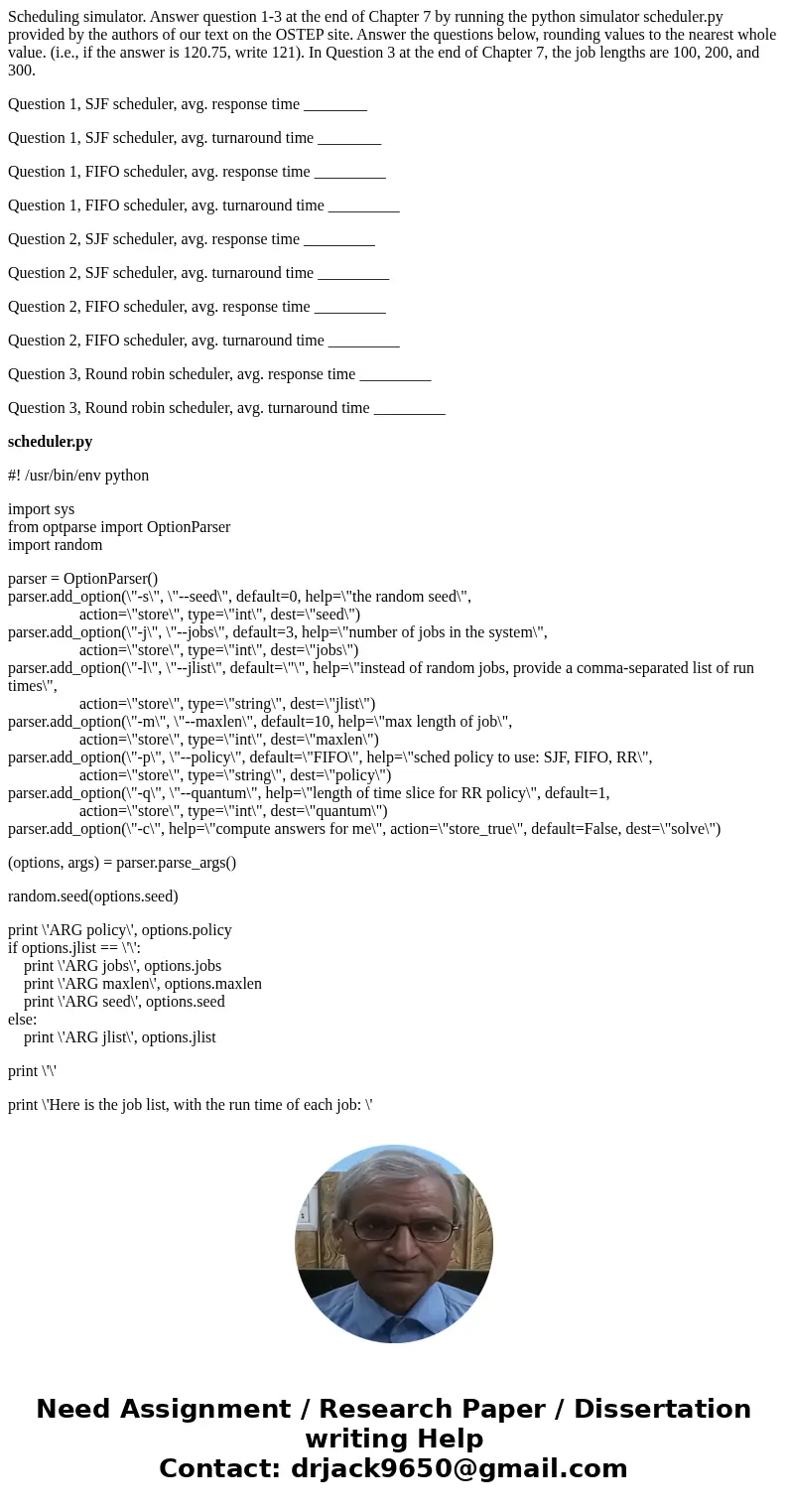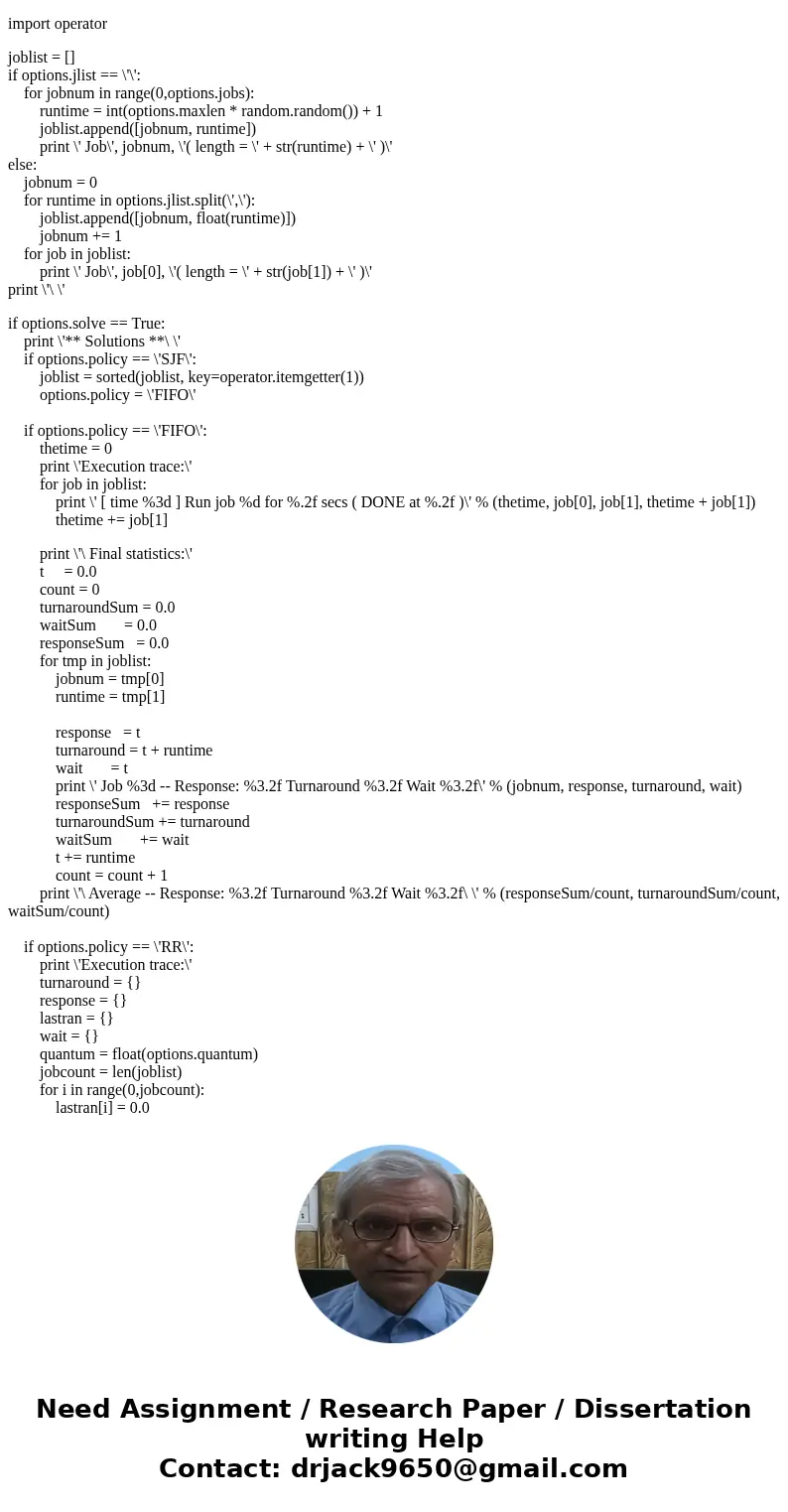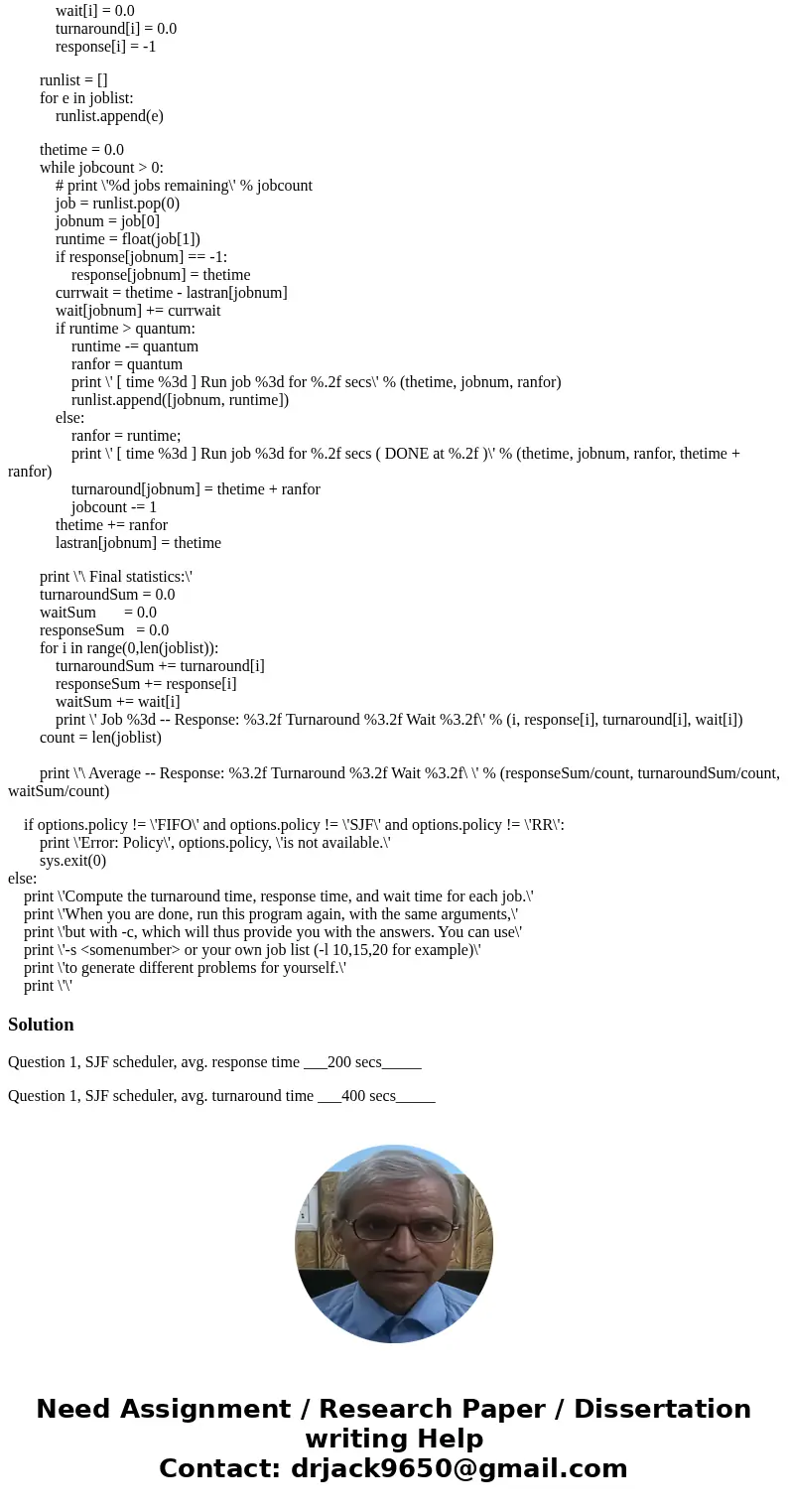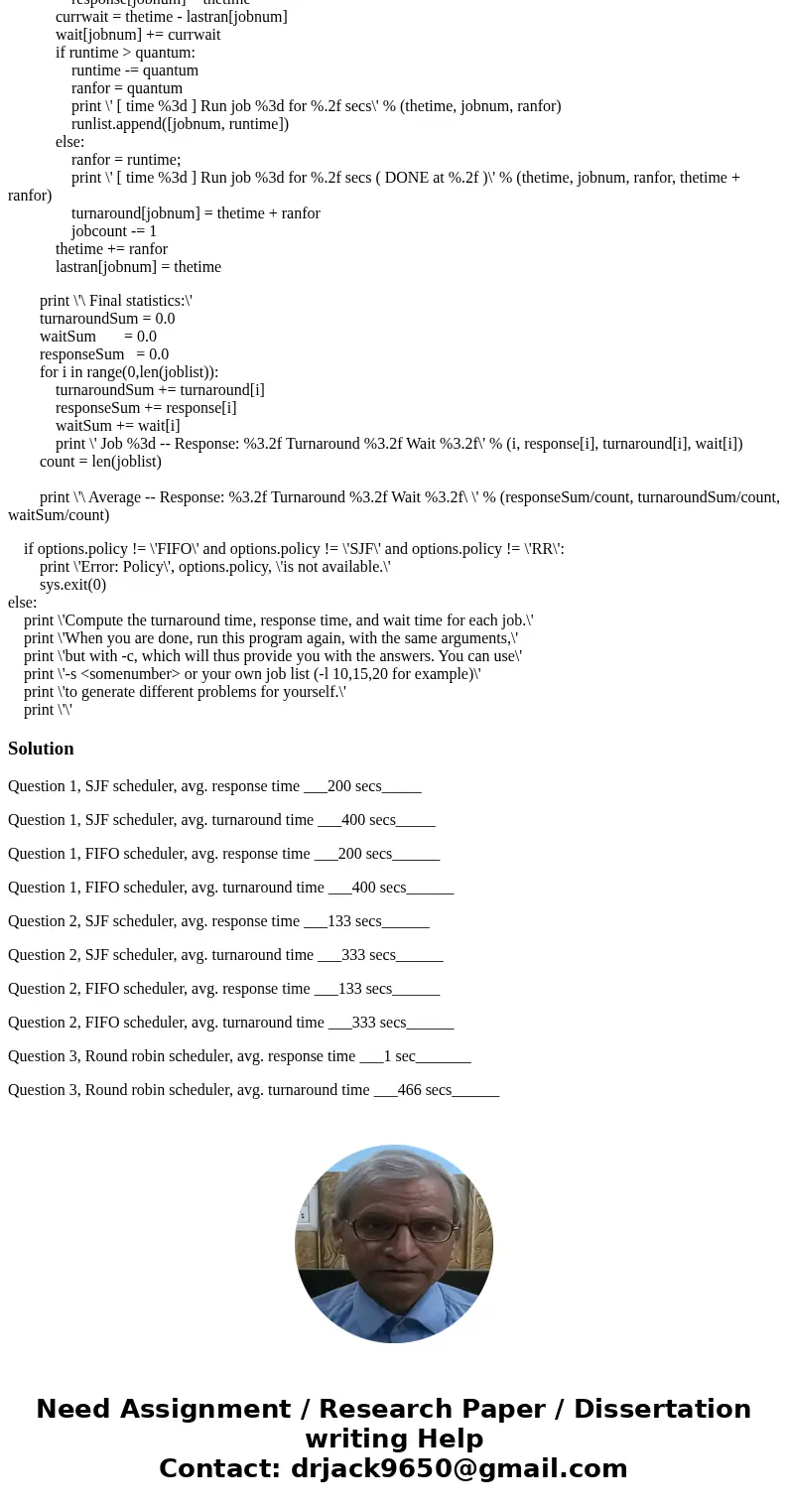Scheduling simulator Answer question 13 at the end of Chapte
Scheduling simulator. Answer question 1-3 at the end of Chapter 7 by running the python simulator scheduler.py provided by the authors of our text on the OSTEP site. Answer the questions below, rounding values to the nearest whole value. (i.e., if the answer is 120.75, write 121). In Question 3 at the end of Chapter 7, the job lengths are 100, 200, and 300.
Question 1, SJF scheduler, avg. response time ________
Question 1, SJF scheduler, avg. turnaround time ________
Question 1, FIFO scheduler, avg. response time _________
Question 1, FIFO scheduler, avg. turnaround time _________
Question 2, SJF scheduler, avg. response time _________
Question 2, SJF scheduler, avg. turnaround time _________
Question 2, FIFO scheduler, avg. response time _________
Question 2, FIFO scheduler, avg. turnaround time _________
Question 3, Round robin scheduler, avg. response time _________
Question 3, Round robin scheduler, avg. turnaround time _________
scheduler.py
#! /usr/bin/env python
import sys
from optparse import OptionParser
import random
parser = OptionParser()
parser.add_option(\"-s\", \"--seed\", default=0, help=\"the random seed\",
action=\"store\", type=\"int\", dest=\"seed\")
parser.add_option(\"-j\", \"--jobs\", default=3, help=\"number of jobs in the system\",
action=\"store\", type=\"int\", dest=\"jobs\")
parser.add_option(\"-l\", \"--jlist\", default=\"\", help=\"instead of random jobs, provide a comma-separated list of run times\",
action=\"store\", type=\"string\", dest=\"jlist\")
parser.add_option(\"-m\", \"--maxlen\", default=10, help=\"max length of job\",
action=\"store\", type=\"int\", dest=\"maxlen\")
parser.add_option(\"-p\", \"--policy\", default=\"FIFO\", help=\"sched policy to use: SJF, FIFO, RR\",
action=\"store\", type=\"string\", dest=\"policy\")
parser.add_option(\"-q\", \"--quantum\", help=\"length of time slice for RR policy\", default=1,
action=\"store\", type=\"int\", dest=\"quantum\")
parser.add_option(\"-c\", help=\"compute answers for me\", action=\"store_true\", default=False, dest=\"solve\")
(options, args) = parser.parse_args()
random.seed(options.seed)
print \'ARG policy\', options.policy
if options.jlist == \'\':
print \'ARG jobs\', options.jobs
print \'ARG maxlen\', options.maxlen
print \'ARG seed\', options.seed
else:
print \'ARG jlist\', options.jlist
print \'\'
print \'Here is the job list, with the run time of each job: \'
import operator
joblist = []
if options.jlist == \'\':
for jobnum in range(0,options.jobs):
runtime = int(options.maxlen * random.random()) + 1
joblist.append([jobnum, runtime])
print \' Job\', jobnum, \'( length = \' + str(runtime) + \' )\'
else:
jobnum = 0
for runtime in options.jlist.split(\',\'):
joblist.append([jobnum, float(runtime)])
jobnum += 1
for job in joblist:
print \' Job\', job[0], \'( length = \' + str(job[1]) + \' )\'
print \'\ \'
if options.solve == True:
print \'** Solutions **\ \'
if options.policy == \'SJF\':
joblist = sorted(joblist, key=operator.itemgetter(1))
options.policy = \'FIFO\'
if options.policy == \'FIFO\':
thetime = 0
print \'Execution trace:\'
for job in joblist:
print \' [ time %3d ] Run job %d for %.2f secs ( DONE at %.2f )\' % (thetime, job[0], job[1], thetime + job[1])
thetime += job[1]
print \'\ Final statistics:\'
t = 0.0
count = 0
turnaroundSum = 0.0
waitSum = 0.0
responseSum = 0.0
for tmp in joblist:
jobnum = tmp[0]
runtime = tmp[1]
response = t
turnaround = t + runtime
wait = t
print \' Job %3d -- Response: %3.2f Turnaround %3.2f Wait %3.2f\' % (jobnum, response, turnaround, wait)
responseSum += response
turnaroundSum += turnaround
waitSum += wait
t += runtime
count = count + 1
print \'\ Average -- Response: %3.2f Turnaround %3.2f Wait %3.2f\ \' % (responseSum/count, turnaroundSum/count, waitSum/count)
if options.policy == \'RR\':
print \'Execution trace:\'
turnaround = {}
response = {}
lastran = {}
wait = {}
quantum = float(options.quantum)
jobcount = len(joblist)
for i in range(0,jobcount):
lastran[i] = 0.0
wait[i] = 0.0
turnaround[i] = 0.0
response[i] = -1
runlist = []
for e in joblist:
runlist.append(e)
thetime = 0.0
while jobcount > 0:
# print \'%d jobs remaining\' % jobcount
job = runlist.pop(0)
jobnum = job[0]
runtime = float(job[1])
if response[jobnum] == -1:
response[jobnum] = thetime
currwait = thetime - lastran[jobnum]
wait[jobnum] += currwait
if runtime > quantum:
runtime -= quantum
ranfor = quantum
print \' [ time %3d ] Run job %3d for %.2f secs\' % (thetime, jobnum, ranfor)
runlist.append([jobnum, runtime])
else:
ranfor = runtime;
print \' [ time %3d ] Run job %3d for %.2f secs ( DONE at %.2f )\' % (thetime, jobnum, ranfor, thetime + ranfor)
turnaround[jobnum] = thetime + ranfor
jobcount -= 1
thetime += ranfor
lastran[jobnum] = thetime
print \'\ Final statistics:\'
turnaroundSum = 0.0
waitSum = 0.0
responseSum = 0.0
for i in range(0,len(joblist)):
turnaroundSum += turnaround[i]
responseSum += response[i]
waitSum += wait[i]
print \' Job %3d -- Response: %3.2f Turnaround %3.2f Wait %3.2f\' % (i, response[i], turnaround[i], wait[i])
count = len(joblist)
print \'\ Average -- Response: %3.2f Turnaround %3.2f Wait %3.2f\ \' % (responseSum/count, turnaroundSum/count, waitSum/count)
if options.policy != \'FIFO\' and options.policy != \'SJF\' and options.policy != \'RR\':
print \'Error: Policy\', options.policy, \'is not available.\'
sys.exit(0)
else:
print \'Compute the turnaround time, response time, and wait time for each job.\'
print \'When you are done, run this program again, with the same arguments,\'
print \'but with -c, which will thus provide you with the answers. You can use\'
print \'-s <somenumber> or your own job list (-l 10,15,20 for example)\'
print \'to generate different problems for yourself.\'
print \'\'
Solution
Question 1, SJF scheduler, avg. response time ___200 secs_____
Question 1, SJF scheduler, avg. turnaround time ___400 secs_____
Question 1, FIFO scheduler, avg. response time ___200 secs______
Question 1, FIFO scheduler, avg. turnaround time ___400 secs______
Question 2, SJF scheduler, avg. response time ___133 secs______
Question 2, SJF scheduler, avg. turnaround time ___333 secs______
Question 2, FIFO scheduler, avg. response time ___133 secs______
Question 2, FIFO scheduler, avg. turnaround time ___333 secs______
Question 3, Round robin scheduler, avg. response time ___1 sec_______
Question 3, Round robin scheduler, avg. turnaround time ___466 secs______




 Homework Sourse
Homework Sourse